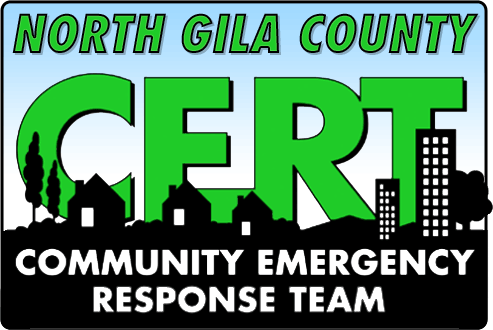Who you gonna call? CERT!
- macfeezor0
- Jun 20, 2019
- 3 min read
Updated: Jun 26, 2019

If you’ve lost your house to a flood and a yellow-vested person offers food from a huge Dutch oven, it could be Mac Feezor from the Community Emergency Response Team.
Feezor, along with Grant Smith, the commander of the North Gila County CERT, pride themselves on feeding hundreds of people during an emergency.
“During the search for the drowned family in the East Verde, we set up dining facilities and did a couple of meals,” said Feezor.
Sometimes it takes more than one semi truck loaded with food to accomplish the job.
“During the Rodeo-Chediski Fire, we had a call in the evening to be ready to feed people in the morning,” said Feezor. “We had three refrigerators, and two deep freezers. We would requisition things from grocery stores ... we had two semis full of food.”
Feezor said they also do the food for local charity events such as the Tamales for Toys.
“They set up at the casino ... with 12 pots of tamale filling ... had an assembly line ... we could do 400 to 500 tamales in an hour,” he said.
But feeding people is one small part of the services CERT supplies to emergency responders and the public.
“Reporters (at the search for the drowned family) needed cell service,” said Feezor. “We provided that ... we can be deployed in two hours.”
Sitting in their converted RV outfitted to serve as a command center, Feezor and Smith showed off their banks of radios, generators and other communications equipment.
“The RV has four bunks and a hide-a-bed, a bath and shower,” said Feezor. “It also has radios, a printer, and a Wi-Fi router. It’s basically a cell tower on wheels with a satellite and a small tower.”
As a back up, CERT has a ham radio in case the Internet and cell service go out.
So what is CERT?
CERT was created by the Federal Emergency Management Agency to offer training to prepare citizens to help with emergencies from the extreme to the highly local.
FEMA training helps prepare volunteers to:
• Safely respond to man-made and natural emergencies
• Organize basic responses to disaster
• Participate in local events to promote being prepared.
Yet FEMA does not oversee the North Gila County CERT. It operates under the authority of the Gila County sheriff.
“The sheriff has the Posse and Search and Rescue (and) has the insurance and are the support for the North Gila County CERT,” said Feezor.
During the drowning emergency, CERT volunteers ended up helping to fill out the mountains of paperwork required at such an emergency — on top of feeding people.
“One of our guys did documentation — activity and communication logs,” said Feezor.
Feezor and Smith said their CERT group even helped out with the Wallow Fire, despite the fire raging in another part of the state.
“During the Wallow Fire, I took a team up from here,” said Feezor. “We were deployed through the county.”
Armed with radios capable of working on 200 channels and other communications equipment, CERT volunteers have strong tools available for fieldwork.
“There is a standard set of frequencies,” said Smith. “The other trailer has a repeater (and) we’re building a portable repeater.”
The radios and repeater come in handy at local events such as the Fire on the Rim Mountain Bike Race and the Mogollon Monster Mudda.
“During the Mudda, we were at the event center and did traffic control,” said Smith.
In fact, most of services the North Gila County CERT provides happen at events.
So, what kinds of people volunteer for CERT?
Feezor said anyone from doctors and nurses to former military and law enforcement officers to plumbers and electricians volunteer for the program.
“We have people who do that stuff — plumbing and electrical,” said Feezor.
It doesn’t take too much to volunteer for CERT.
“You need a background check and to fill out an application with the Gila County Sheriff’s Office,” said Feezor.
“The basic course is 20 hours,” said Smith.
“After that, there are special classes on an ongoing basis,” said Feezor.
Most deployments have between 30 and 40 people, but CERT always needs more volunteers.
Feezor suggested CERT training could help even if volunteers aren’t on duty.
“The difference between an emergency and an inconvenience is preparation,” said Feezor.
For more information or to volunteer, contact CERT at 928-978-4132
Article Courtesy of the Payson Roundup Contact the reporter at mnelson@payson.com


Comments